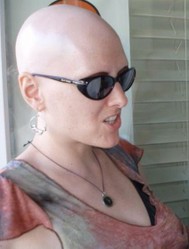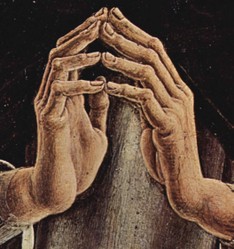Thankfully, it is becoming more acceptable to see women in public with substantial hair loss, although it is still regarded as bizarre by many. Celebrity sufferers of hair loss, such as Gail Porter in the UK, Thea Chassin in the US, plus the myriad of stars who have voluntarily opted for the bald look, are helping to improve the confidence of women who have lost or are losing their hair. However, there is no denying that for most women hair loss is a devastating blow to self-esteem.
There is no cure - but things can and often do improve and the more we know about the condition the more confident we will become in dealing with it.



















 How to Choose a Walking Cane or Stickon 08/01/2014
How to Choose a Walking Cane or Stickon 08/01/2014
 Michael Miller Fabulous Fabric Swatches for Quilting, Crafts etcon 07/02/2014
Michael Miller Fabulous Fabric Swatches for Quilting, Crafts etcon 07/02/2014
 The Drama of Life in the Rock Poolon 06/08/2014
The Drama of Life in the Rock Poolon 06/08/2014
 The Flâneur - Symbol of Modernity in 19th Century Parison 05/09/2014
The Flâneur - Symbol of Modernity in 19th Century Parison 05/09/2014



Comments
You are so lucky!! :)
I have very thick hair I often complain about, I won't be doing that any more...
Hi WordChazer - Yes, I too like my hair fairly short - but would never be brave enough to go out in public with no hair. I ain't got the guts... I do admire Joanna Rowsell - what a star! However, for those who are mere mortals, there are some beautiful wigs out there nowadays and in fact, they are so wonderful that even some women with perfectly good hair are opting for them now and again. Whatever floats your boat! Thanks for your lovely post!
My hair is one of the few parts of me I could live without and not feel self conscious (just perhaps a bit chilly at times!) If I had to lose some part of me totally to one disease or another, my hair would likely be top of the list, as I always try to keep it short and feel very self conscious when it is not hedghehog-meets-buzzcut. One of my favorite people is Joanna Rowsell, the UK cyclist, as she has not let her alopecia stand in the way of being a fit, happy, medal-winning female role model. That all said, I am aware that to many women, long hair is a badge of identity as much as my buzzcut is for me, and I know that many cancer sufferers feel less secure and more unwell for losing their locks. To me, straggles get in the way of head-turning earrings, glasses and headphones and are indicative of a lack of my self-control, at some level. When I was younger I was encouraged to be the girly girl, with a shoulder length bob of very fine hair, Since having it cut short in my teens, my hair has thickened considerably and in my early 40s, I'm now going a family-traditional iron grey in streaks (that photo is flattering and a couple of years old!) I am hoping to end up a grey-white with the same short cut I have now, but my hormones are beginning to cut in for the menopause so anything is possible!
Brenda, you are so lucky to have thick hair!! The writeway: I wouldn't have the guts to go without a wig myself and admire those women who do.I know what you mean - in a perfect world these things wouldn't matter. I am intrigued that your dream encouraged you to speak in public. That's an excellent outcome for something that is so often regarded as negative. Dreams of hair loss are often said to be a warning sign that we should look after our health and become more proactive in our life choices. I don't know if this is true, but it's an interesting thought. Thanks both of you for your posts.
My grandmother suffered from this, and resorted to wigs while I knew her. She had very little left when she died. I kind of wish she hadn't covered up. I'd really like to see more women have the options that men do - there are some pretty beautiful scalps out there.
On a random note, a few years back, I had a dream that I woke up with no hair, and instead of it being a horrible thing, it got me into hard core public speaking...
I truly believe that so many of the things we think are weaknesses can be strengths.
Very interesting. I've always had extremely thick hair, but I have lost some with menopause.
Bobski606 - I am so pleased that you found this article encouraging. And so glad your hair is growing back - it takes time and patience but it's such a great feeling. Good luck! :)
What a great article! I suffer from alopecia too but thankfully I have managed to get it under control and my hair is finally starting to grow back. Mine was triggered by a change in medication and a really poor diet, I couldn't change the meds so I changed my diet and now I feel so much better. It's good to know that there are these support groups out there, especially if it ever comes back again.
Thanks so much ologsinquito - so glad you liked it!